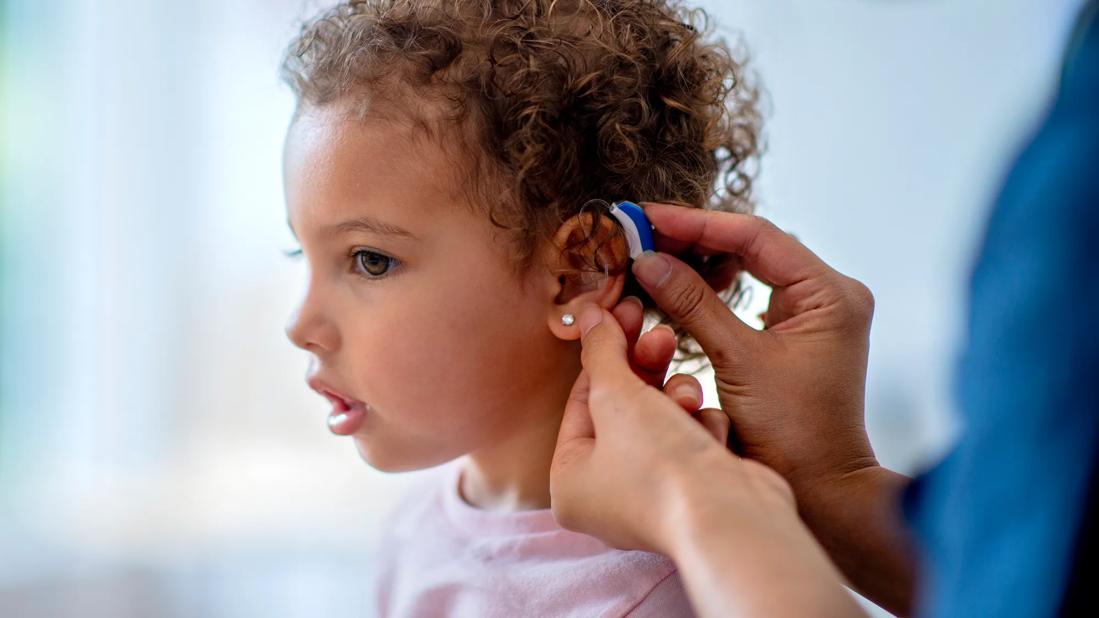The research also identified a gap in how quality of life among NCNIDD children is measured, which will be addressed

Although the speech and development benefits of cochlear implantation (CI) in normally developing children have been extensively shown, these measures are difficult to demonstrate in noncommunicative, neurologically impaired, and developmentally delayed (NCNIDD) children. A new study from Cleveland Clinic researchers evaluated the perceived health-related quality of life (QoL) benefits of CI among normally developing children and NCNIDD children. The study was published in Otolaryngology– Head and Neck Surgery.
Advertisement
Cleveland Clinic is a non-profit academic medical center. Advertising on our site helps support our mission. We do not endorse non-Cleveland Clinic products or services. Policy
“After children get cochlear implants, we often test them audiometrically and we follow their speech and language development. This includes tracking metrics to make sure that the implant is helping the child over time,” explains Samantha Anne, MD, the Medical Director of Pediatric Ear and Hearing Disorders in Cleveland Clinic’s Head & Neck Institute and one of the study’s authors. “However, we are not always able to accurately test NCNIDD children because they may not be able to give us the pristine audiometric data we need to see how much they’re hearing. Another issue is that we don’t know how much they’re processing from what they’re hearing.”
To understand the benefits of CI in NCNIDD children, the researchers decided to concentrate primarily on the quality of life gains of CI in NCNIDD children. A retrospective review was performed to identify patients who had received CI prior to the age of 18 and had CI for at least four months. Inclusion criteria for the NCNIDD group was that the patient must have formal assessment of developmental delay by a neurologist or developmental pediatrician. Of these patients, only patients who were noncommunicative verbally and had neurologic impairment with limited to no cognitive ability were included. The Children with Cochlear Implants: Parental Perspectives survey was sent to potential participants through email solicitation. The analysis of the data from the survey focused on eight domains of outcomes after CI including communication, general functioning, self-reliance, well-being and happiness, social relationships, education, effects of implantation, and supporting the child.
Advertisement
The authors found that when they compared the domain scores from parents with children with NCNIDD, parents of normally developing children responded with overall more favorable responses in all domains. Although not as positive, parents of children with NCNIDD responded neutral or favorably to most domains, with average scores ranging from 3.04 to 3.48 (only the ‘‘support the child’’ and ‘‘self-reliance’’ domains had negative responses with average scores 2.68 and 2.90 respectively).
“We compared the survey results between the two groups, and we found that overall the parents of the normally developing children responded more favorably in all domains in comparison to the neurologically impaired children,” says. Dr. Anne. “However, parents of the neurologically impaired children still answered neutrally or favorably in almost all of the domains. So even though they’re not seeing the benefits as powerfully as the normally developing children, the parents of the neurologically impaired children are still seeing benefits of doing a cochlear implant.”
One limitation of the study was that the survey that was used in the study is meant for all children and may not have been necessarily sensitive to the issues that come up in neurologically impaired children.
“This survey was not the best instrument to study quality of life in this group because there are instances where the questions are not relevant to a child that have a severe cognitive disability,” explains Dr. Anne. “But, unfortunately, there’s no other measures out there. Even with using this type of survey, there were still some positive benefits seen with quality of life. Now, the plan is to take this present study and use it to look at trying to develop a questionnaire that’s more sensitive to the issues that the cognitively impaired children may have.”
Advertisement
Once the research group is able to improve the survey to be more cognizant of issue encountered by NCNIDD children, Dr. Anne anticipates similar results in follow-up studies. “Over the years I’ve been doing cochlear implants among children like this, my impression has been the parents rarely regret the decision to put the implants in,” says Dr. Anne. “The feedback I often get is that they do respond a little bit more, make some kind of facial movements of recognition when there’s sound, or they seem to enjoy music more.”
“At Cleveland Clinic, we treat the neurologically impaired children very similarly to how we treat normally developing children in terms of the cochlear implant pathway,” Dr. Anne continues. “Obviously, we take into consideration the family’s wishes and overall health of the child, but if they meet criteria for implantation, we don’t delay the process just because they have cognitive disability. We still believe in giving access to sound and improving quality of life.’
Advertisement
Advertisement

Analysis of HNSCC patients shows HPV status to be predictive of higher abundance of oncobacteria within the tumor

Case study illustrates the potential of a dual-subspecialist approach

Evidence-based recommendations for balancing cancer control with quality of life

Study shows no negative impact for individuals with better contralateral ear performance

HNS device offers new solution for those struggling with CPAP

Patient with cerebral palsy undergoes life-saving tumor resection

Specialists are increasingly relying on otolaryngologists for evaluation and treatment of the complex condition

Detailed surgical process uncovers extensive middle ear damage causing severe pain and pressure.